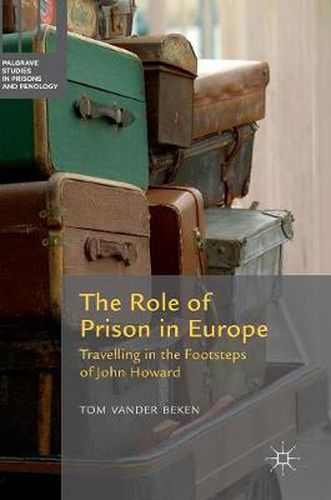Readings Newsletter
Become a Readings Member to make your shopping experience even easier.
Sign in or sign up for free!
You’re not far away from qualifying for FREE standard shipping within Australia
You’ve qualified for FREE standard shipping within Australia
The cart is loading…






This title is printed to order. This book may have been self-published. If so, we cannot guarantee the quality of the content. In the main most books will have gone through the editing process however some may not. We therefore suggest that you be aware of this before ordering this book. If in doubt check either the author or publisher’s details as we are unable to accept any returns unless they are faulty. Please contact us if you have any questions.
This book discusses the role of the prison in Europe across a divide of over 200 years. Inspired by the travels of the prison reformer John Howard (1726-1790), who visited prisons across Europe in the eighteenth century, it fundamentally reflects on centuries of the practice of locking people up as punishment. Howard travelled across Europe to visit prisons, with a simple method: he travelled and knocked on prison doors on his journey and entered the premises. He then observed the situation in the prison, took notes and left to visit other locations. Howard’s influential book The State of the Prisons resulted from his experiences, provoking debate among prison reformers and academics worldwide. Adopting the contemporary methods of prison tourism research, the author follows in Howard’s footsteps. He draws on extensive research conducted in prisons across six countries: England, Norway, the Netherlands, France, Italy and Azerbaijan. Howard’s reflections are used as a frame to assess contemporary prisons, particularly revolving around the questions of what prisons are for today, and what they should (or should not) be. It will be of great interest to criminologists researching prisons and penology, as well as historians interested in the histories of punishment.
$9.00 standard shipping within Australia
FREE standard shipping within Australia for orders over $100.00
Express & International shipping calculated at checkout
This title is printed to order. This book may have been self-published. If so, we cannot guarantee the quality of the content. In the main most books will have gone through the editing process however some may not. We therefore suggest that you be aware of this before ordering this book. If in doubt check either the author or publisher’s details as we are unable to accept any returns unless they are faulty. Please contact us if you have any questions.
This book discusses the role of the prison in Europe across a divide of over 200 years. Inspired by the travels of the prison reformer John Howard (1726-1790), who visited prisons across Europe in the eighteenth century, it fundamentally reflects on centuries of the practice of locking people up as punishment. Howard travelled across Europe to visit prisons, with a simple method: he travelled and knocked on prison doors on his journey and entered the premises. He then observed the situation in the prison, took notes and left to visit other locations. Howard’s influential book The State of the Prisons resulted from his experiences, provoking debate among prison reformers and academics worldwide. Adopting the contemporary methods of prison tourism research, the author follows in Howard’s footsteps. He draws on extensive research conducted in prisons across six countries: England, Norway, the Netherlands, France, Italy and Azerbaijan. Howard’s reflections are used as a frame to assess contemporary prisons, particularly revolving around the questions of what prisons are for today, and what they should (or should not) be. It will be of great interest to criminologists researching prisons and penology, as well as historians interested in the histories of punishment.